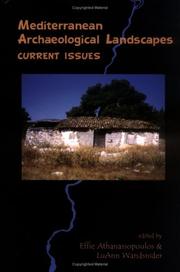| Listing 1 - 4 of 4 |
Sort by
|

ISBN: 1283212501 1931707731 1934536288 9786613212504 Year: 2004 Publisher: University of Pennsylvania Press
Abstract | Keywords | Export | Availability | Bookmark
 Loading...
Loading...Choose an application
- Reference Manager
- EndNote
- RefWorks (Direct export to RefWorks)
Book

ISBN: 9781934536285 Year: 2010 Publisher: Philadelphia
Abstract | Keywords | Export | Availability | Bookmark
 Loading...
Loading...Choose an application
- Reference Manager
- EndNote
- RefWorks (Direct export to RefWorks)


ISBN: 9781934536285 9781931707732 Year: 2010 Publisher: Philadelphia, Pa University of Pennsylvania Press
Abstract | Keywords | Export | Availability | Bookmark
 Loading...
Loading...Choose an application
- Reference Manager
- EndNote
- RefWorks (Direct export to RefWorks)
Book

ISBN: 2869585306 Year: 2021 Publisher: Athènes : École française d’Athènes,
Abstract | Keywords | Export | Availability | Bookmark
 Loading...
Loading...Choose an application
- Reference Manager
- EndNote
- RefWorks (Direct export to RefWorks)
La civilisation byzantine a marqué durablement de son empreinte les hommes et les sociétés du Sud-Est de l’Europe. Après la chute de Constantinople en 1453, cette civilisation fut dissociée de l’État qui lui avait servi de cadre pendant plus d’un millénaire, l’Empire byzantin. Contraints par un nouveau pouvoir substitué à l’ancien, celui de l’Empire ottoman, les héritages de Byzance n’en disparurent pas pour autant. Ils cheminèrent dans les mémoires et les coutumes, dans l’histoire et la foi, dans des institutions formelles ou informelles. Et quand les peuples anciennement soumis à l’Empire byzantin ou sujets à son influence s’affirmèrent comme nations, quand ils entreprirent d’écrire leur passé et de se projeter dans un avenir européen – à partir des Lumières et plus encore aux XIXeet XXe siècles –, Byzance fut naturellement repensée, réévaluée, réinventée. L’ambition de ce volume collectif est d’étudier, de façon comparée et grâce à des études de chercheurs de tous pays, l’histoire de la mémoire de Byzance dans les sociétés sud-est européennes. Une conclusion s’en dégage : plus qu’une nostalgie et mieux qu’une curiosité, Byzance apparaît comme l’un des fondements de notre Europe contemporaine. The Byzantine civilisation has left a lasting mark on individuals and societies of South-Eastern Europe. After the fall of Constantinople in 1453 it lost the frame, the Byzantine Empire, in which it had flourished for more than a millennium. Although restrained by a new power, the Ottoman Empire, Byzantine legacies never disappeared but survived in memories and traditions, in history and faith, in formal or informal institutions. And when peoples formerly included in the Byzantine Empire or subject to its influence established themselves as nations, when they started writing their past and considered what could be their European fate – from the Enlightenment, but especially in the 19th and 20th centuries – Byzantium was naturally reconsidered, reassessed, reinvented. The…
History --- religion --- identité culturelle --- civilisation --- histoire culturelle --- péninsule balkanique --- historiographie byzantine
| Listing 1 - 4 of 4 |
Sort by
|

 Search
Search Feedback
Feedback About UniCat
About UniCat  Help
Help News
News